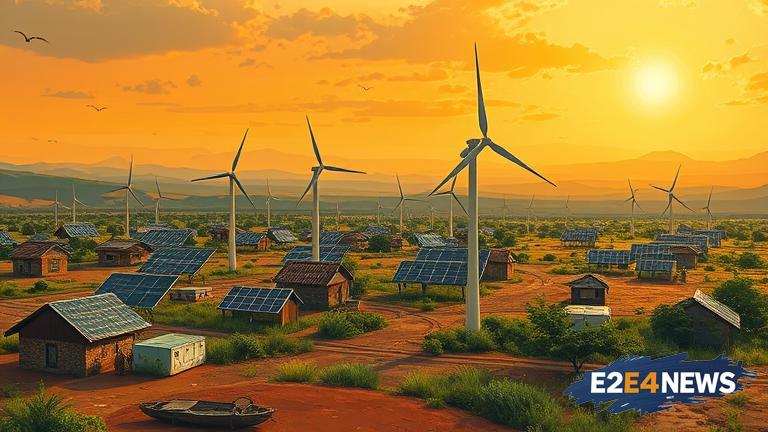The African continent is witnessing a significant shift towards renewable energy, driven by the need to address the pressing issues of energy access, climate change, and sustainable development. With many countries still struggling to provide reliable and affordable electricity to their citizens, renewable energy has emerged as a viable solution. Solar and wind power are becoming increasingly popular, with countries like South Africa, Egypt, and Morocco leading the way. The cost of renewable energy technologies has decreased dramatically over the years, making them more competitive with fossil fuels. This has led to a surge in investments in the renewable energy sector, with many international companies and organizations committing to support Africa’s energy transition. The African Union’s Agenda 2063 has set ambitious targets for renewable energy, aiming to increase the share of renewables in the energy mix to at least 50% by 2030. To achieve this goal, countries are implementing policies and regulations to support the development of renewable energy projects. For instance, South Africa has introduced a renewable energy independent power producer procurement program, which has attracted significant investment and led to the development of several large-scale solar and wind farms. Similarly, Egypt has launched a feed-in tariff program to encourage the development of renewable energy projects, particularly solar power. Morocco, on the other hand, has set a target of generating 52% of its electricity from renewable sources by 2030 and is investing heavily in solar and wind energy. The benefits of renewable energy are numerous, including reduced greenhouse gas emissions, improved air quality, and enhanced energy security. Moreover, renewable energy can create jobs and stimulate local economies, contributing to sustainable development and poverty reduction. However, despite the progress made, there are still significant challenges to be addressed, including the lack of infrastructure, limited access to financing, and regulatory barriers. To overcome these challenges, international cooperation and support are essential, and organizations like the International Renewable Energy Agency (IRENA) are playing a crucial role in promoting the adoption of renewable energy in Africa. The private sector is also critical in driving the growth of renewable energy, and companies like Vestas, Siemens Gamesa, and Enel Green Power are already making significant investments in the continent. Furthermore, innovative financing models, such as green bonds and crowdfunding, are being explored to support the development of renewable energy projects. In addition, there is a growing recognition of the importance of energy storage and grid infrastructure in supporting the integration of renewable energy into the grid. As the demand for energy continues to grow, Africa has a unique opportunity to leapfrog traditional fossil fuel-based energy systems and transition directly to renewable energy. This would not only help to mitigate climate change but also ensure that the continent’s energy needs are met in a sustainable and equitable manner. The future of renewable energy in Africa looks promising, with many countries committed to transitioning to a low-carbon economy and reducing their dependence on fossil fuels. As the continent continues to grow and develop, it is likely that renewable energy will play an increasingly important role in meeting its energy needs and promoting sustainable development. With the right policies, investments, and international support, Africa can become a leader in the global transition to renewable energy, creating a more sustainable and prosperous future for its citizens.
